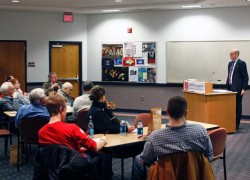
America has an addictive appetite for alarmism, an appetite that one history professor argues has affected politics for more than 50 years.
Fredrik Logevall, international studies and history professor at Cornell U., spoke about alarmism and how it has affected American politics and foreign policy since the mid 20th century, on Tuesday at Ohio State U.
Alarmism is a way of framing an enemy in such a way that makes it seem as if it can unravel society and its threat is much greater than it really is, Logevall said.
“It reinforced Americans’ moralistic tendency to see any hostility directed to their nation as legitimate and to want to frame those conflicts that did arise in black and white, good versus evil, terms — angels against devils, in which the very future of civilization was at stake,” Logevall said. “After all, a legitimate enemy is an absolute enemy, with whom you can have no dialogue or interaction until he disappears or is utterly transformed, abandoning his hostility.”
Logevall focused mostly on the Cold War but also touched on the Vietnam War and the War in Iraq, and how alarmism has contributed to those wars. He said the wars would not have had the public support they had if not for the alarmist ways the government presented the threats of the Soviet Union, Vietnam and Iraq to the American people, and that they might not have been such a focus of the public agenda.
Logevall said he hoped “to explain this exaggeration of the Soviet threat in the decades after World War II. … I would argue that the phenomenon that I’m describing outlives the fall of the Soviet Union, and indeed is still with us today.”
He argued although alarmism is certainly used in other countries, it is used differently in America because of the way our governmental power is disbursed. He went on to tell the audience of about 25 that U.S. political parties are weak, and because they depend on popular support, they tend to exaggerate a threat in order to gain that support and unite people in the face of a threat, real or imagined.
“Any satisfactory answer to the question before us and to understanding what I refer to as the ‘uses of alarmism’ has to involve giving due attention to the manipulation of fear by officials and interest groups to gain political and institutional advantage,” he said.
Sophie Shiloh, a first-year OSU student in international relations and diplomacy, said she agreed with his perspectives about alarmism. She said she thinks it is important for people to see the differences between something negative that is a tragedy because it was unavoidable, and a crime which is committed for personal gains.
“There is a lot more at play when people decide to go to war than, ‘Is it right?’ or, ‘Is this gonna help us?’ There’s money, there’s political gains, there’s, you know, societal pressure — there’s just so many more things than just the conflict itself and he really emphasized that,” Shiloh said. “I think that’s really important for people to understand, especially when he was talking about the tragedy versus the Machiavellian approach.”
Logevall is the John S. Knight Professor of International Studies and the director of the Mario Einaudi Center for International Studies at Cornell. Logevall earned his Ph.D. in 1993 from Yale University after earning his Bachelor’s degree from Simon Fraser University in 1986. He has had eight books published, and is working on another.
Robert McMahon, the OSU history professor who invited Logevall to speak, said he chose Logevall because he has another book coming out soon and is one of the leaders in the U.S. foreign relations history field.
McMahon said the Mershon Center and the Department of History try to bring in three speakers annually as part of their partnership. He said speakers give a formal presentation and also conduct an informal seminar that focuses on graduate students. He said the audience for the formal presentation included undergraduates, graduates, professors and community members.
“I thought it was very stimulating, very provocative, and I was really pleased that there was so much engagement on the part of the audience with the points he raised,” he said.
Logevall ended by saying that journalists, as a whole, did not question the Iraq War when it first began, and that America has an addiction to alarmism.
“America still spends more on its military than, depending on how you measure it, either the rest of the world combined or the next 11 or 12 countries combined. It still spends about 10 times more than its closest competitor, that being China,” he said. “The addiction continues.”
